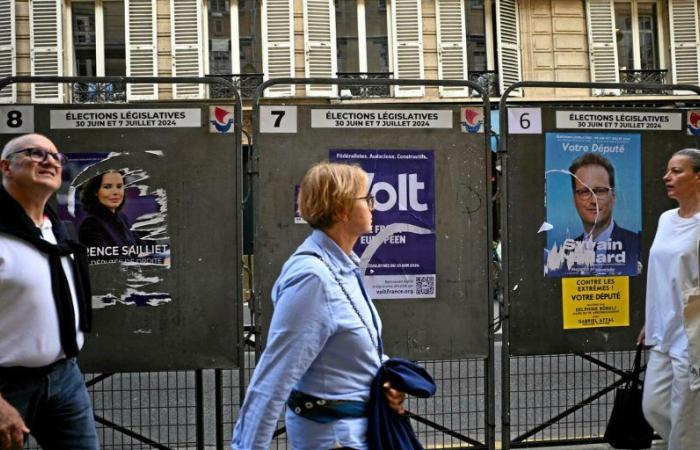MDespite the arrival of summer, nothing new under the sun. Two days before the first round of early legislative elections, our latest Cluster17 estimate confirms the trend towards the polarization of the vote and the consolidation of voting intentions.
Every Thursday at 7:30 a.m.
Receive a preview of information and political analyzes from the Point editorial staff.
Merci !
Your registration has been taken into account with the email address:
To discover all our other newsletters, go here: MyAccount
By registering, you accept the general conditions of use and our confidentiality policy.
Credited with 35% of the vote, against 34.5% last Tuesday, the National Rally (RN) remains in the lead, benefiting from an increased number of transfers of votes from Reconquête voters. Slightly losing ground, the New Popular Front (NFP) displays 29.5% of voting intentions (against 30%), still far ahead of the presidential bloc at 20% (against 19.5%).
In terms of seat projections, an estimate that remains very uncertain before the results of the first round, the RN would outpace its competitors by sending 210 to 255 deputies to the Assembly. The NFP would obtain between 180 and 220 seats, and the majority could re-elected 65 to 110 parliamentarians. The Republicans (LR) would fight over the crumbs with the other lists, recovering respectively between 25 and 35 seats and between 20 and 30 seats.
86% of voters are sure of their choice
“There is no notable dynamic,” summarizes Jean-Yves Dormagen, founder of the Cluster17 institute and professor of political science at the University of Montpellier. We are in a situation which seems quite crystallized, and which confirms what we have seen from the beginning: electorates very firmly positioned on their voting intentions, with very little hesitation and few second choices. »
READ ALSO The vote of anger
86% of voters who will vote are thus sure of their choice, with a peak at 94% and 91%, respectively, for RN and NFP supporters. The level of participation, slightly up 0.5% to reach 65%, is “all the more remarkable since the French have already voted on June 9, notes the founder of Cluster17. A significant part of the population is aware that this is an important election, which mobilizes.”
“People seem to be more clear-cut about voting or abstaining,” he adds. However, 14% of voters say they could “still change their minds,” a higher proportion among LR and Reconquête voters. These voters “tend to mainly turn to the RN, which explains why the LR-RN coalition will probably have more, or even significantly more, than its score in the European elections,” the pollster predicts.
The Republican front, stop or still?
“The great uncertainty of this election at this stage,” he continues, “is what the effect of the first round will be on the voters. How will voters react to the fact that the RN and Jordan Bardella have a relative, or even absolute, majority within reach? »
An observation that is probably “not completely integrated” by a part of the public, in particular the centrist electorate, whose reactions during the inter-rounds will be decisive in the outcome of the vote. “Either we will see the establishment of a dynamic of amplification of the progression of the RN and its allies, or the results of this first round will on the contrary produce a reconstitution of a form of republican front”, says Jean-Yves Dormagen.
READ ALSO Legislative elections: how do triangular races work? The potential abstention of voters in the current majority in the case of the RN-NFP duel has also declined over the past week, going from 70% to 50%. “In 3 out of 4 cases, their vote would be for the NFP,” points out the professor of political science. We therefore returned to a situation at the start of the campaign, which had deteriorated, linked to the omnipresence of Jean-Luc Mélenchon in the media and to the majority’s narrative based on the equating of two extremes. »
Today, this narrative has evolved a little, as evidenced by Édouard Philippe’s calls for “a grand coalition that would go from the right to the ecological left as an alternative to the RN” and Gabriel Attal’s positions more virulent towards the extreme right than the left during the two televised debates of the week. “This discourse that comes from the most popular and important leaders of the presidential majority can impact voters,” confides Jean-Yves Dormagen.
Centrist voters, key to the election?
According to him, “political leaders from Sunday 8 p.m. will have an important role to play, depending on the positions they take.” Will they choose to withdraw in the event of finishing in third place during a triangular, as certain left-wing leaders have announced in recent days? Will there be “a clear call from the leaders of the different camps to block the RN”? Will these decisions lead to a surge in participation, as was the case in 1997 between the two rounds? “If the Renaissance electorate, for example, abstains at 40% or 70% in the case of an NFP-RN duel, the result will not be the same,” recalls the pollster.
READ ALSO European elections: why young people don’t voteWill the vote be decided by the majority voters? Jean-Yves Dormagen has no doubt about it: “The participation, the mobilization and the choice made by the voters whose candidates were eliminated in the first round will be absolutely decisive for the second round scenario.” For its part, the RN electorate seems less worried than the others about the results of these elections: 68% say that it “really matters to them to know who will win the early legislative election”, compared to 76% of Renaissance voters and 87% of NFP voters.
“It’s an electorate that is on average a little less politicized, a little more skeptical of politicians,” deciphers Jean-Yves Dormagen. “They expect less significant impact on their lives from the election results, they’re a somewhat disillusioned electorate.” And he concludes: “Most voters think that the RN will win these elections, and they answer this question with this idea in mind. […] I also read their response as the fact that those who fear the RN fear it with more intensity than those who hope for it. » Are their fears founded? Verdict this Sunday, at 8 p.m.






